Two years ago, during my stay in Ithaca, I met this young man full of energy and life. We have been friends since then.
-I used to hangout with my colleagues at Downtown Ithaca on Friday nights . After days of work and studies, we just wanted to start our weekend with some dancing at Lot 10 or couple it with some live music concerts at The Range.
One Friday, I missed the regular weekend routine to see the rest of town. That was the night I missed the performance from the Mosaic Foundation Reggae Band. The next morning, I remember Reuben and Mike tell me about a singer from the night before. They said he sung so well and was the lead singer of the band that played that night. He was Ghanaian too. They told me they invited him to visit our place in Stewart Ave sometime.
So one Saturday, there was a knock on our door. I was the one to open it. There stood a man in dreads, smiling at me. Mike followed up and exclaimed “that’s our friend from the bar, the singer from that night!”. I smiled. First words I found myself say was “ɛte sɛn? ” (how are you?). He responded “Nana, ɛyɛ” (I’m fine, king). It felt like I’ve known him for years.
He brought us lunch that day. Banku (from corn flour) and aponkye nkrakra (chevon pepper soup). He also showed us where to get ingredients to make local food. He made our afternoon!
After lunch, we had a lengthy chat about our lives. His real name was Augustine Yao Foli, grew up in Hohoe in the Volta region of Ghana. He told us about the farms he worked with and roles he played there, from being a farm mechanic to being in farm management. We delved deep into topics of agriculture. His emotions were palpable. The singer from that night appeared different in my eyes now. He spoke with much passion. He spoke more on farm mechanization and the need for healthy agricultural practices. He seemed passionate about it all. We talked about other things too and had some good laughs.
We have had many conversations after that day. One time, I decided to know more about “the singer from that night” and other things he’s into. The rest only validates the proverb “Do not judge a book by its cover”. I’ll share with you all I learnt.
How did you start doing music and how long have you been in the art?
Music has been my hobby since my childhood. As time went by, it grew within me, and now, I am sharing and delivering the message. I am thankful for all the support from friends and fans. Music is a spirit and it’s power. When used appropriately, it is akin to respect, understanding, peace and love. I am the lead singer and percussionist in the Mosaic Foundation Reggae Band. We have four albums and have been together for ten years. (*For more information about Mosaic Foundation visit www.mosiacfoundationmusic.com)
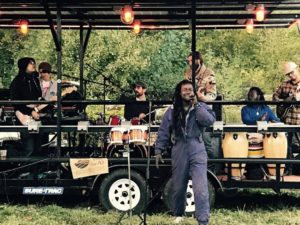
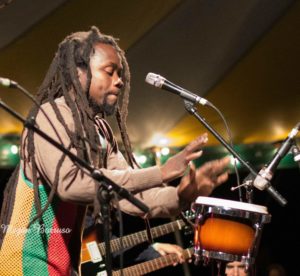
What is your current job and what does it entail?
I am a community researcher and an advisor with a national group of researchers representing underserved communities throughout the U.S.A and Mexico. We call ourselves the ICBOs (Independent Community-based Organizations) and we work in close partnership with the Cornell Lab of Ornithology. We are trying to better understand why we have not made significant advances in fostering justice, equity, diversity, and inclusion in STEM (Science Technology Engineering and Mathematics) research and programming. Together we have been focused on understanding the role of partnerships in the implementation of equitable research.
We, as community researchers, participate in all phases of the research and collectively have a community framework to help guide our work. (*To learn more visit www.stemforall2018.videohall.com)
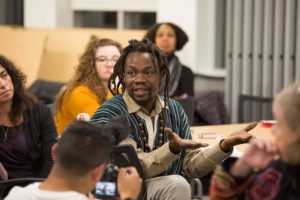
In the fall of 2018, the ICBOs (in collaboration with the Cornell Lab of Ornithology) received a 2.5 million dollar National Science Foundation award: Developing the Processes and Potential to Engage Historically Underrepresented Communities in Public Participation in STEM Research Through Authenticity and Impact. Through this award, we are using our past research and community framework to co-create a global community science project focused on Noise Pollution, a topic of concern to our communities. Our processes include a community review board of non-negotiables, working agreements, and methodologies that have helped us gain and maintain trust and transparency in our work. I am in my second year working with the ICBO.
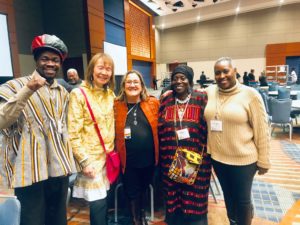
Is there any important position you occupy? What are your specific roles?
I deliver presentations on ICBO research at conferences, including in Georgia, California, North Carolina, Indiana, and Seattle. I conduct noise pollution surveys in the US and Ghana and I facilitate ICBO meetings.
I am also the farm manager at Northstar farm, this is new. I started last year and looked forward to keeping it going. I grow vegetables for the Northstar Restaurant in Ithaca, New York . It’s one of Ithaca’s finest restaurants located in the Fall Creek community.
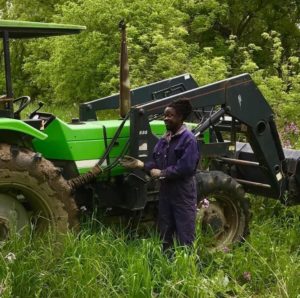
How is agriculture viewed in the US compared to how it is viewed in Africa (Ghana). Also, what is the difference between being a farmer in the US and being a farmer in Africa?
This is a complicated and constructive question. Agriculture is the backbone of America. It is astonishing to see huge farms and sophisticated farming equipment. There is a lot of mechanization in American agriculture due to large scale production and the population. One of the reasons I think large scale farming in America may be static is due to a few people involved in growing food. In Ghana, almost every house depends on their farm produce.
But this scenario is changing. There are agricultural education groups, NGOs for example Groundswell Center for Local Food and Agriculture is educating and creating awareness of food justice and the importance of healthy foods, helping farmers with the availability of funds, and a farm business planning class to support farmers. There is also a youth farm educational program to help the young ones get access to know how to grow food and nutritional value of what they grow and eat. Many communities are getting into consumer and farmer relationships where they purchase directly or indirectly (Community Supported Agriculture) from the
farmer.
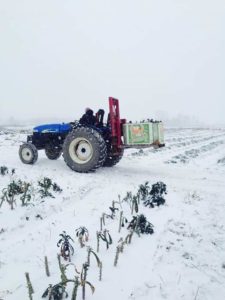
I have learnt a lot from the previous farms I worked at ,Cazenovia NY, West haven farm Ithaca NY, Stick and stone farm Ithaca NY and Sweet land farm Trumansburg NY. Learning by practice is always the act of the day at the farms. There are manuals to read or the internet to access information about equipment you are fixing. Most of the farm equipment is fixed at the farm. There are a lot of opportunities to learn at farms if you pay attention. The knowledge and skill attained will stay with you forever and could be applicable anywhere. Most small scale farms do not have huge equipment but few tractors and simple farm implements.
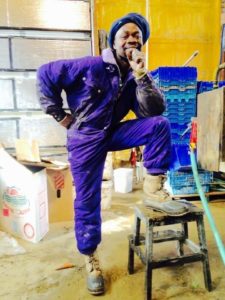
I have noticed there is huge respect for farmers here. I have also noticed the community in Ithaca and beyond understands the dedication, commitment and effort farmers put into their work. Farming is hard work and a vital occupation. Farmers play a very important role in public health when their cultivation practices and problem-solving skills are healthier choices. Personal story to share with you is, I was overwhelmed by how customers appreciate and acknowledge during CSA pick up. The positive conversation and motivation from customers cheer up my soul and grease up my elbow too.
How do we make agriculture sustainable for our people?
For Ghana, to be able to maintain and keep agriculture sustainable, we must keep our culture within agriculture. Agriculture used to be sustainable but due to the change in the mindset of our leaders concerning food production we don’t see that anymore. We eat more imported food than locally grown ones. These do not help the local farmer. Price competition pushes the local farmer down the drain. How could a local farmer afford to live, competing with international corporations in the local market?
This is a good call to all of us to revisit the lost African foods. Educating our communities about the biological and nutritional value of our local vegetables and other crops are very important. The question is what are we growing? Why are we growing them? And, what is the end-benefit of what we grow and consume? An honest answer to these questions is a pathway to supporting our communities with healthier approaches that necessitate healthy food production.
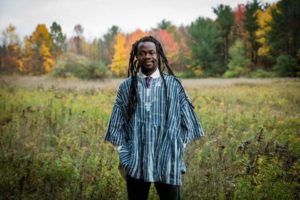
Is Africa on the right path to being food secure? If not, what is the path for us?
I appreciate African countries that have taken the stand to say no to unnecessary importations. How could Africa be on the right path of food security while the markets are filled with imported products and our soils and water polluted by mycotoxins? There is no amount of fasting and prayers to save us from our own pollution and wrong mindset. How far does the awareness of
climate change reach in our villages? This is another huge issue that would prompt international food aid if we don’t face reality with our common sense, traditional ecological knowledge and healthier alternative approaches to combat climate change.
Our local vegetables and crops are rich in nutritional values and we don’t need to import expensive medicine or nutritional supplements.
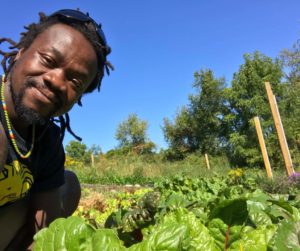
Africa is blessed with all the resources and it’s up to us to make good use of what we have. We need to research on our own local crops while making the benefits of our local food and understanding they are unique. Without laboratories and laboratory equipment, our forefathers identified essential herbs and their uses. Their knowledge is still available and practiced by few. Where is our culture in agriculture? For example, moringa and neem, that are common in Africa provide multivitamins and serve other useful purposes. Both plants have the potential to serve beneficially in animal production and human health. Moringa and neem are also biological pesticides for animals and soil borne diseases. Locally, how much awareness and education are being done about these magic plants to boost public health and increase production?
Today it is all about Ghana rice! What about the rest of our local vegetables and crops? We should project all other local agricultural produce the same way we highlight Ghana rice. If we don’t promote and patronize our own no one will for us!
How do we make agriculture attractive to the youth?
Let us call a spade a spade. We need to tell the youth the importance of healthy agricultural practices. An agricultural practice that has no adverse health implications. Food is medicine, we must view any food we eat as medicine. We must tell the youth the truth about the dangerous effects of food insecurity and teach them to understand food security. The truth creates new thinking and begin new initiatives. The youth are the future. There are many children around the world suffering from malnutrition and health implications from toxic chemicals derived from food they consume. If we rebrand agriculture by defining it with its essential benefits to human health and the environment, agriculture would be regarded an attractive venture to the youth.
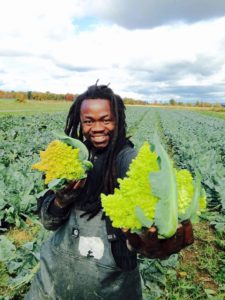
What projects do you have running back at home?
Ndor Eco Village has been my life vision. Thanks to all numerous and generous donors for their support for Ndor. Ndor has come a long way and by hook or crook, we will accomplish what we envisioned. It is an “eco-village” that serves as a community for sustainable agriculture and environmental education. We are currently in partnership with students from the department of Integrated Digital Media (IDM.Grow) by Professor Venessa Harden. This is a partnership for developing co-creation prototype solution to problems based on problems farms and farmers are encountering. For example, designing structures to collect enough rainwater during rainy season to prevent lack of water during dry season. Designing simple farm tools or multi-purpose suitable for the task. Also into community farming engagements that bring the youth, farmers, community leaders and partners together. (*For more information about Ndor Eco Village visit www.ndorecovillage.org)
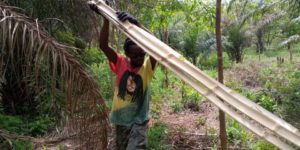
How many people are benefiting from it and how long is this expected to last?
Our vision is to educate and develop the minds of our community to sustain the environment that feeds and employs us. It’s a community-engaged and community benefit project.
Foli and I have been communicating even after I returned home. His passion to help his people is enormous. A few times, we made plans to visit some amazing places together on his next visited to Ghana.
During his recent visit, he shared with me some pictures from his projects at Hohoe. A guest house near completion, a sheep pen amidst other projects to serve his community.
From him, I’ve learned to give back to society whenever I can. I may have missed the singer from the night I missed the concert but I’m glad I never missed the other man in him!
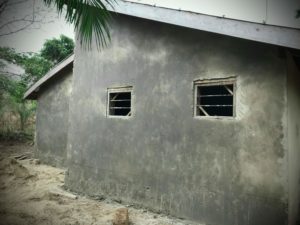
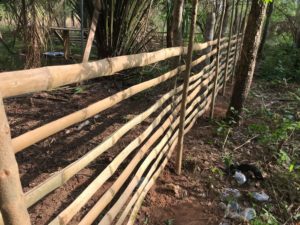
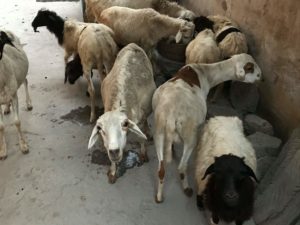
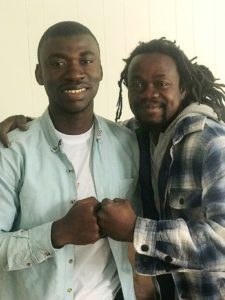
By: Dennis Baffour-Awuah

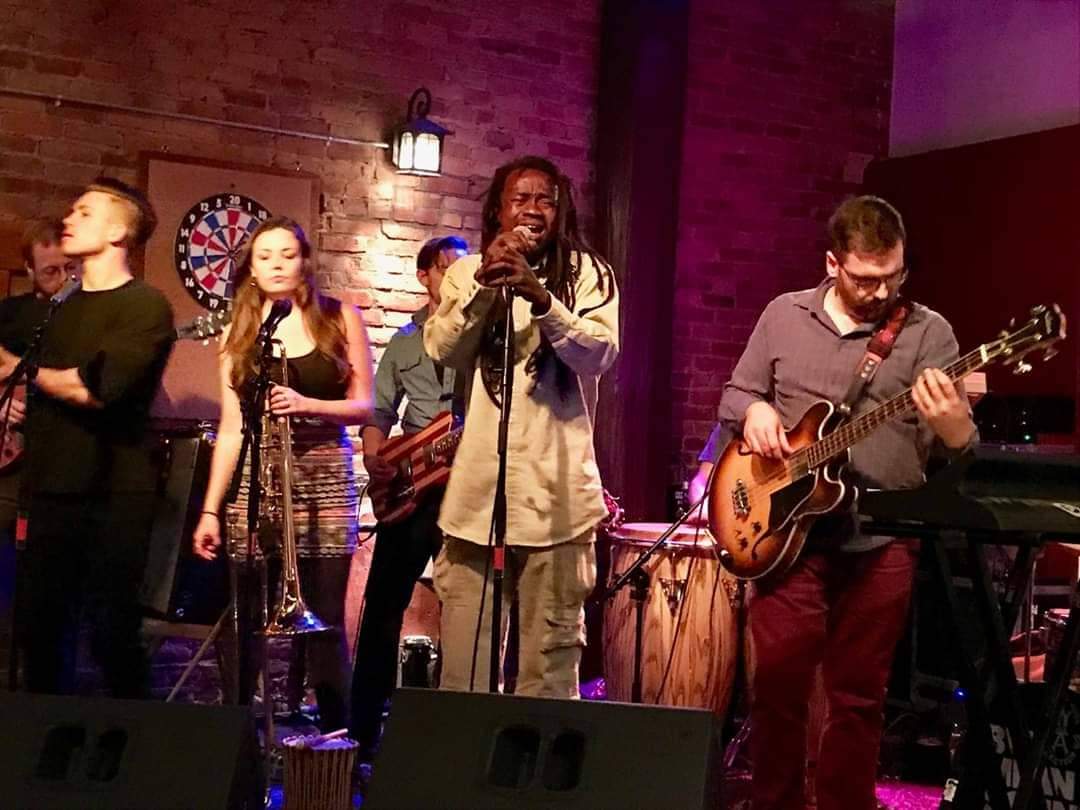

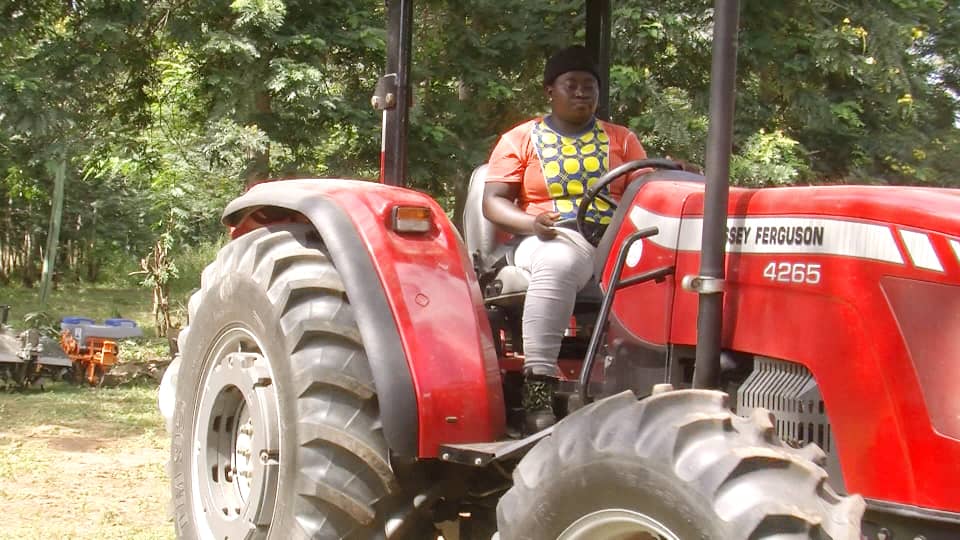
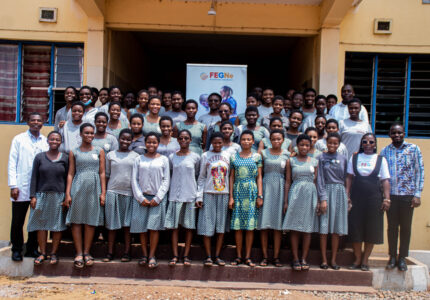
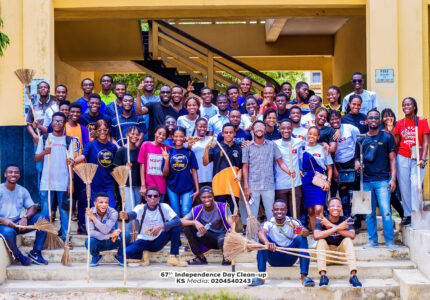
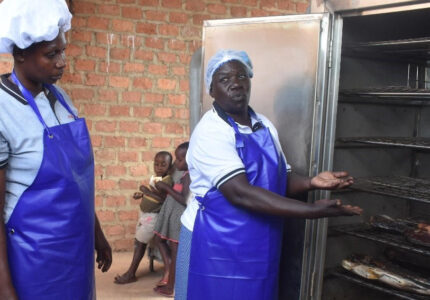
Duncan
This is very inspirational. Passion, zeal and remembrance/ gratefulness are the key things I pick from his story. He really loved what he’s doing and is keen on learning more to become better at what he’s doing.
He’s also giving back to his people…wow❤️❤️
Keep job bro..????